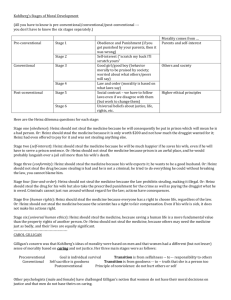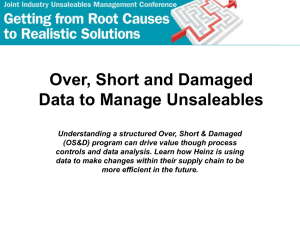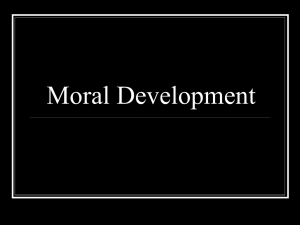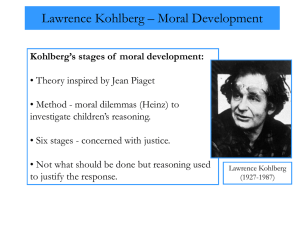Kohlberg`s Stages HO
advertisement
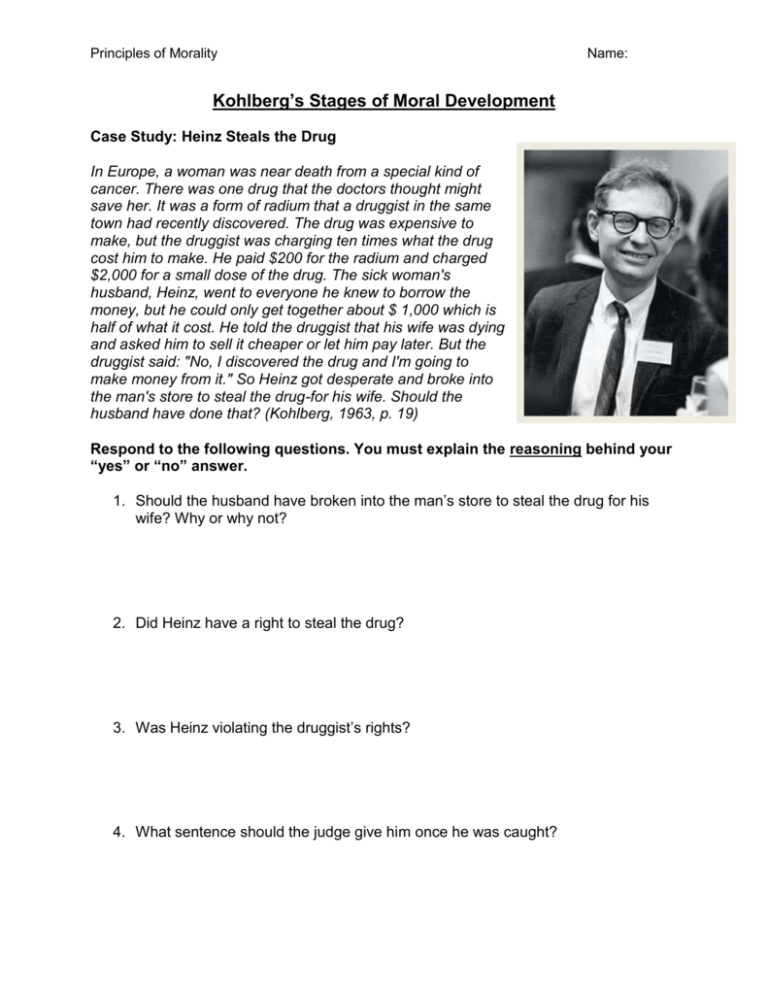
Principles of Morality Name: Kohlberg’s Stages of Moral Development Case Study: Heinz Steals the Drug In Europe, a woman was near death from a special kind of cancer. There was one drug that the doctors thought might save her. It was a form of radium that a druggist in the same town had recently discovered. The drug was expensive to make, but the druggist was charging ten times what the drug cost him to make. He paid $200 for the radium and charged $2,000 for a small dose of the drug. The sick woman's husband, Heinz, went to everyone he knew to borrow the money, but he could only get together about $ 1,000 which is half of what it cost. He told the druggist that his wife was dying and asked him to sell it cheaper or let him pay later. But the druggist said: "No, I discovered the drug and I'm going to make money from it." So Heinz got desperate and broke into the man's store to steal the drug-for his wife. Should the husband have done that? (Kohlberg, 1963, p. 19) Respond to the following questions. You must explain the reasoning behind your “yes” or “no” answer. 1. Should the husband have broken into the man’s store to steal the drug for his wife? Why or why not? 2. Did Heinz have a right to steal the drug? 3. Was Heinz violating the druggist’s rights? 4. What sentence should the judge give him once he was caught? Principles of Morality Name: Lawrence Kohlberg, an American psychologist, born in Bronxville, New York is famous for his research in moral education, reasoning, and developing stages of moral development. LEVEL I: PRE - CONVENTIONAL MORALITY Stage 1: ___________________________________________________ Stage 2: ___________________________________________________ LEVEL II: CONVENTIONAL MORALITY Stage 3: ____________________________________________________ Principles of Morality Name: Stage 4: ____________________________________________________ LEVEL III: POST - CONVENTIONAL MORALITY Stage 5: ____________________________________________________ Stage 6: ____________________________________________________ Principles of Morality Name: Below is a list of possible arguments that belong to the six stages. Decide which stage each scenario belongs to and explain why. Then think of a word or two that would best describe the values/actions presented by the particular argument and stage of moral development as proposed by Kohlberg. Heinz should steal the medicine because his wife expects it; he wants to be a good husband. Or: Heinz should not steal the drug because stealing is bad and he is not a criminal; he tried to do everything he could without breaking the law, you cannot blame him. Stage: Explanation: Descriptive Word: Heinz should steal the medicine, because saving a human life is a more fundamental value than the property rights of another person. Or: Heinz should not steal the medicine, because others may need the medicine just as badly, and their lives are equally significant. Stage: Explanation: Descriptive Word: Heinz should not steal the medicine because the law prohibits stealing, making it illegal. Or: Heinz should steal the drug for his wife but also take the prescribed punishment for the crime as well as paying the druggist what he is owed. Criminals cannot just run around without regard for the law; actions have consequences. Stage: Explanation: Descriptive Word: Principles of Morality Name: Heinz should steal the medicine because he will be much happier if he saves his wife, even if he will have to serve a prison sentence. Or: Heinz should not steal the medicine because prison is an awful place, and he would probably languish over a jail cell more than his wife's death. Stage: Explanation: Descriptive Word: Heinz should not steal the medicine because he will consequently be put in prison which will mean he is a bad person. Or: Heinz should steal the medicine because it is only worth $200 and not how much the druggist wanted for it; Heinz had even offered to pay for it and was not stealing anything else. Stage: Explanation: Descriptive Word: Heinz should steal the medicine because everyone has a right to choose life, regardless of the law. Or: Heinz should not steal the medicine because the scientist has a right to fair compensation. Even if his wife is sick, it does not make his actions right. Stage: Explanation: Descriptive Word: Principles of Morality Name: Kohlberg’s Stages of Moral Development Visual Flow Chart Assignment Rubric Create a visual diagram/flow chart using text and images to present and explain the key components of Kohlberg’s Theory of Moral Development. Your diagram must include the three distinct levels as well as the six stages of development. Use pictures, words, arrows, quotes, or any other symbols that help to convey Kohlberg’s theory. Your diagram should be done on an 8.5 x 11 piece of blank paper. ***Please hand in this criteria sheet with your assignment. CRITERIA ASSESSMENT Knowledge/ Understanding of topic Student addresses each component of Kohlberg’s theory clearly and displays a solid understanding of the topic. Communication/Presentation Clarity and visual presentation Communicates facts and ideas with a high degree of clarity The flow chart is well organized and easy to follow The format incorporates the use of visual aids, text, and especially symbols to enhance meaning Assignment is neat, and is colourful Effort is visible in the creative presentation of assignment TOTAL MARK: NOTES/ COMMENTS 0 2 4 6 8 10 0 1 2 3 4 5 0 1 2 3 4 5 /15 DUE: Friday, November 20th Principles of Morality Name: Principles of Morality Name: Lawrence Kohlberg, an American psychologist, born in Bronxville, New York is famous for his research in moral education, reasoning, and developing stages of moral development. His theory, which is the basis for ethical behaviour, states that there are six identifiable developmental constructive (knowledge and meaning constructed from experience) stages and with each stage an individual becomes progressively better at responding to moral dilemmas than the last. Kohlberg was interested in how people would justify their actions if they were put in a moral dilemma. He created stories for people of various ages and cultural backgrounds and had them respond to specific questions. He then grouped the responses into six distinct stages which were grouped into three levels: pre-conventional, conventional, and post-conventional. As a person grows and experiences life they move forward in stages. Kohlberg believed that no one could move in reverse, nor could anyone “jump” forward stages. Each stage provides a new perspective and is more complex than the previous. He thought only about 25% of persons actually grows to stage six, the majority remain in stage four. Level I: Preconventional Morality Stage 1: Obedience and Punishment orientation. Actions are evaluated in terms of possible punishment, not goodness or badness; obedience to power is emphasized. How can I avoid punishment? Stage 2: Pleasure-seeking orientation. Proper action is determined by one's own needs; concerns for the needs of others is largely a matter of "you scratch my back and I'll scratch yours," not of loyalty, gratitude, or justice. What’s in it for me? Level II: Conventional Morality Stage 3: Good boy/good girl orientation. Good behavior is that which pleases others in the immediate group or which brings approval; the emphasis is on being "nice." Conforming to social norms Stage 4: Authority orientation. In this stage the emphasis is on upholding law, order, and authority, doing one's duty, and following social rules. Law and Order morality Principles of Morality Name: Level III: Post conventional Morality Stage 5: Social-contract orientation. Support of laws and rules is based on rational analysis and mutual agreement; rules are recognized as open to question but are upheld for the good of the community and in the name of democratic values. Ex. Charter of Rights and Freedoms Stage 6: Morality of individual principals. Behavior is directed by self-chosen ethical principals that tend to be general, comprehensive, or universal; high value is placed on justice, dignity, and equality of all persons. Universal ethical principles Principles of Morality Name: Below is a list of possible arguments that belong to the six stages. Decide which stage each scenario belongs to and explain why. Then think of a word or two that would best describe the values/actions presented by the particular argument and stage of moral development as proposed by Kohlberg. Stage one (obedience): Heinz should not steal the medicine because he will consequently be put in prison which will mean he is a bad person. Or: Heinz should steal the medicine because it is only worth $200 and not how much the druggist wanted for it; Heinz had even offered to pay for it and was not stealing anything else. Stage two (self-interest): Heinz should steal the medicine because he will be much happier if he saves his wife, even if he will have to serve a prison sentence. Or: Heinz should not steal the medicine because prison is an awful place, and he would probably languish over a jail cell more than his wife's death. Stage three (conformity): Heinz should steal the medicine because his wife expects it; he wants to be a good husband. Or: Heinz should not steal the drug because stealing is bad and he is not a criminal; he tried to do everything he could without breaking the law, you cannot blame him. Stage four (law-and-order): Heinz should not steal the medicine because the law prohibits stealing, making it illegal. Or: Heinz should steal the drug for his wife but also take the prescribed punishment for the crime as well as paying the druggist what he is owed. Criminals cannot just run around without regard for the law; actions have consequences. Stage five (human rights): Heinz should steal the medicine because everyone has a right to choose life, regardless of the law. Or: Heinz should not steal the medicine because the scientist has a right to fair compensation. Even if his wife is sick, it does not make his actions right. Stage six (universal human ethics): Heinz should steal the medicine, because saving a human life is a more fundamental value than the property rights of another person. Or: Heinz should not steal the medicine, because others may need the medicine just as badly, and their lives are equally significant.
